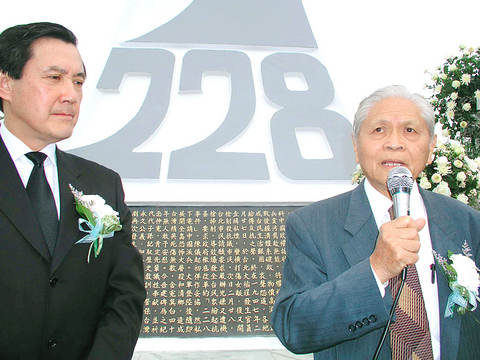Chinese Nationalist Party (KMT) Chairman Ma Ying-jeou (
The memorial ceremony, titled "Reflect humbly, hold a sincere dialogue and keep the promise," was staged to mark the 59th anniversary of the 228 Incident. It was first of a series of 228 memorial events the KMT arranged to work toward reconciliation with the 228 victims and their family members.
"While it was the government that made the decision [regarding the 228 Incident], the KMT was the ruling party and so the KMT is not without responsibilities," Ma said yesterday in his speech.

PHOTO: YU HSUEH-LAN, TAIPEI TIMES
The chairman said suppression of the government at that time was the main cause behind the incident.
"To prevent it from happening again, the government needs to avoid corruption," he said.
Ma said that the ceremony, which invited 228 victims, their family members and party officials to take part in sincere dialogue, was a "very important and meaningful event" and a crucial part of his efforts to promote reconciliation.
"Fifty-nine years after the incident, many victims or their family members are still sad, and it is hard for outsiders to understand how they feel. Without tolerance and understanding, the 228 Incident will never be put to rest," he said.
But Ma stopped short of a formal apology for the incident, which most of the 228 victims and their families were waiting for.
"I have already apologized so many times in the past," the chairman said later when confronted by the media.
Chang Liang-ze (
"The intention of this event is good, but it's not enough. Ma didn't offer an apology. He is not sincere," he said.
Some other families of the victims, on the other hand, said that they were not concerned about an apology.
"Is Ma's apology going to help to those who died [in the incident]? The apology is not important. What matters is to reform the KMT and transform it into a real Taiwanese local party," said Chang An-man (
In addition to Ma, KMT officials including KMT vice chairman Wu Po-hsiung (吳伯雄) and Legislator John Chiang (蔣孝嚴), grandson of dictator Chiang Kai-shek (蔣介石), also attended the ceremony.
Chiang's appearance at the ceremony upset some of the families. They demanded that Chiang offer an apology for what his grandfather did or else be expelled from the event.
A recent official report on the incident contends that Chiang Kai-shek was the mastermind of the 228 Incident. John Chiang said he understood the families' feelings, but refused to apologize because he rejected what he called "a report that lacks direct evidence."
"Until the truth comes out, there's no need for me to offer any apology," he said yesterday.
The 228 Incident refers to the KMT's bloody crackdown on demonstrators under Chiang Kai-shek's administration in 1947 after an incident in Taipei on Feb. 28 of that year. The incident culminated in the slaughter of tens of thousands of Taiwanese at the hands of KMT troops.

FALSE DOCUMENTS? Actor William Liao said he was ‘voluntarily cooperating’ with police after a suspect was accused of helping to produce false medical certificates Police yesterday questioned at least six entertainers amid allegations of evasion of compulsory military service, with Lee Chuan (李銓), a member of boy band Choc7 (超克7), and actor Daniel Chen (陳大天) among those summoned. The New Taipei City District Prosecutors’ Office in January launched an investigation into a group that was allegedly helping men dodge compulsory military service using falsified medical documents. Actor Darren Wang (王大陸) has been accused of being one of the group’s clients. As the investigation expanded, investigators at New Taipei City’s Yonghe Precinct said that other entertainers commissioned the group to obtain false documents. The main suspect, a man surnamed

DEMOGRAPHICS: Robotics is the most promising answer to looming labor woes, the long-term care system and national contingency response, an official said Taiwan is to launch a five-year plan to boost the robotics industry in a bid to address labor shortages stemming from a declining and aging population, the Executive Yuan said yesterday. The government approved the initiative, dubbed the Smart Robotics Industry Promotion Plan, via executive order, senior officials told a post-Cabinet meeting news conference in Taipei. Taiwan’s population decline would strain the economy and the nation’s ability to care for vulnerable and elderly people, said Peter Hong (洪樂文), who heads the National Science and Technology Council’s (NSTC) Department of Engineering and Technologies. Projections show that the proportion of Taiwanese 65 or older would

Democracies must remain united in the face of a shifting geopolitical landscape, former president Tsai Ing-wen (蔡英文) told the Copenhagen Democracy Summit on Tuesday, while emphasizing the importance of Taiwan’s security to the world. “Taiwan’s security is essential to regional stability and to defending democratic values amid mounting authoritarianism,” Tsai said at the annual forum in the Danish capital. Noting a “new geopolitical landscape” in which global trade and security face “uncertainty and unpredictability,” Tsai said that democracies must remain united and be more committed to building up resilience together in the face of challenges. Resilience “allows us to absorb shocks, adapt under

Taiwan Semiconductor Manufacturing Co (TSMC, 台積電) yesterday said it is building nine new advanced wafer manufacturing and packaging factories this year, accelerating its expansion amid strong demand for high-performance computing (HPC) and artificial intelligence (AI) applications. The chipmaker built on average five factories per year from 2021 to last year and three from 2017 to 2020, TSMC vice president of advanced technology and mask engineering T.S. Chang (張宗生) said at the company’s annual technology symposium in Hsinchu City. “We are quickening our pace even faster in 2025. We plan to build nine new factories, including eight wafer fabrication plants and one advanced